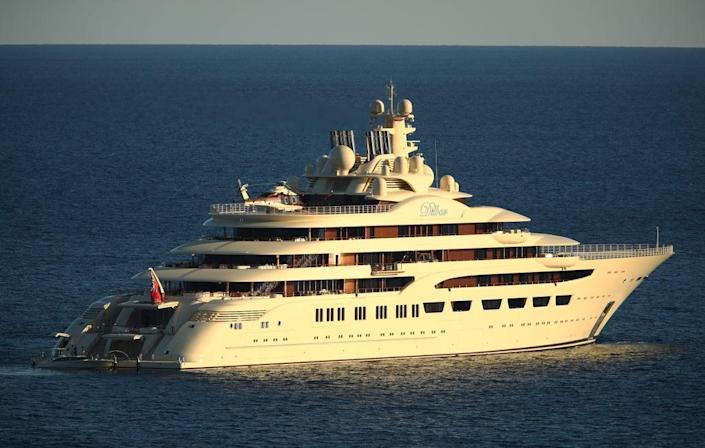
Until last week, Russian oligarchs might have felt close to untouchable onboard their superyachts, free to enjoy their almost limitless wealth wherever in the world they pleased.
Now, the net has begun closing in around Vladimir Putin‘s closest allies, who are rushing to safe havens and selling off assets as European authorities swoop to confiscate the spoils of their time dominating post-Soviet Russia.
On Wednesday, French authorities took a yacht owned by Igor Sechin, chief executive of Russian oil and gas firm Rosneft, former KGB agent and close Putin ally. The 88-metre ‘Amore Vero’ – or ‘true love’ – is valued at €108m.
The seizure came after customs officers noted that the yacht was “taking steps to sail off urgently, without the repair works being over”, the French finance ministry said.


Not to be outdone, Hamburg port authorities seized a $600m vessel owned by Russian metal tycoon Alisher Usmanov, according to Forbes magazine.
Dilbar, the largest superyacht ever built at 156m long, had docked in the port for maintenance work. Other more mobile vessels owned by Russia’s elite have been tracked heading for the Maldives.
The seizures have served to highlight a notable lack of action by the UK. Despite London being a hub for oligarchs’ wealth for years, no property has yet been confiscated from any rich Russians since the invasion of Ukraine began.
Labour MP Chris Bryant accused Boris Johnson of being “frightened” to act.
He said: “I don’t understand why we haven’t seized a single Putin oligarch yacht, palace or serious asset yet. Unlike our European neighbours.”
He added: “Auction houses, including Christie’s and Sotheby’s, are likely see some very valuable assets being traded by Putin supporters. They should refuse to handle them.”
Michael Gove, the levelling up secretary, is drawing up a “hit list” of oligarchs closest to Mr Putin whose assets are in the governments’ crosshairs but experts questioned whether any action would ever be taken.
Oliver Bullough, author of Moneyland, a book detailing the rise of the offshore finance world and those who abuse it, warned that such confiscations are “never going to happen”.
Legal experts have warned that it could take months to build a case sanctions case against Russian oligarchs that would allow property to be confiscated.
In the meantime, Moscow’s ultra-wealthy tycoons are expected to redouble their efforts to shield their wealth from seizure.
Roman Abramovich put Chelsea Football Club up for sale this week after 19 years as owner. He is also reported to be seeking quick buyers for his £100m-plus home in Kensington Palace Gardens – a road known as “billionaires row” – as well as a riverside home in Chelsea.


A number of oligarchs’ yachts are now in the Maldives, a country that has no extradition treaty with the US.
A superyacht owned by a US-sanctioned Russian billionaire Oleg Deripaska arrived in the Maldives this week. The 73-metre Clio dropped anchor off the Maldives capital this week, according to shipping data website Marine Traffic.
According to its maker, Lürssen, Clio “was designed for long voyages around the world and self-sufficient living for several months at a time.”
Mr Deripaska, who is founder of aluminium giant Rusal, was sanctioned by the US in 2018.
The Titan, owned by Alexander Abramov, a co-founder of Russian steel producer Evraz, arrived in the Maldives on Monday and three more oligarchs’ yachts were in the area this week. They included the 88-metre (288-foot) Nirvana owned by Russia’s richest man, Vladimir Potanin.
Even if they remain beyond the clutches of western enforcement agencies, oligarchs may soon encounter problems.
Superyachts require a lot of upkeep and there are a limited number of places equipped to carry out maintenance on superyachts. Anyone who does work on a vessel of a sanctioned oligarch may find that they themselves are in breach of sanctions.
The Independent has a proud history of campaigning for the rights of the most vulnerable, and we first ran our Refugees Welcome campaign during the war in Syria in 2015. Now, as we renew our campaign and launch this petition in the wake of the unfolding Ukrainian crisis, we are calling on the government to go further and faster to ensure help is delivered. To find out more about our Refugees Welcome campaign, click here. To sign the petition click here. If you would like to donate then please click here for our GoFundMe page.




